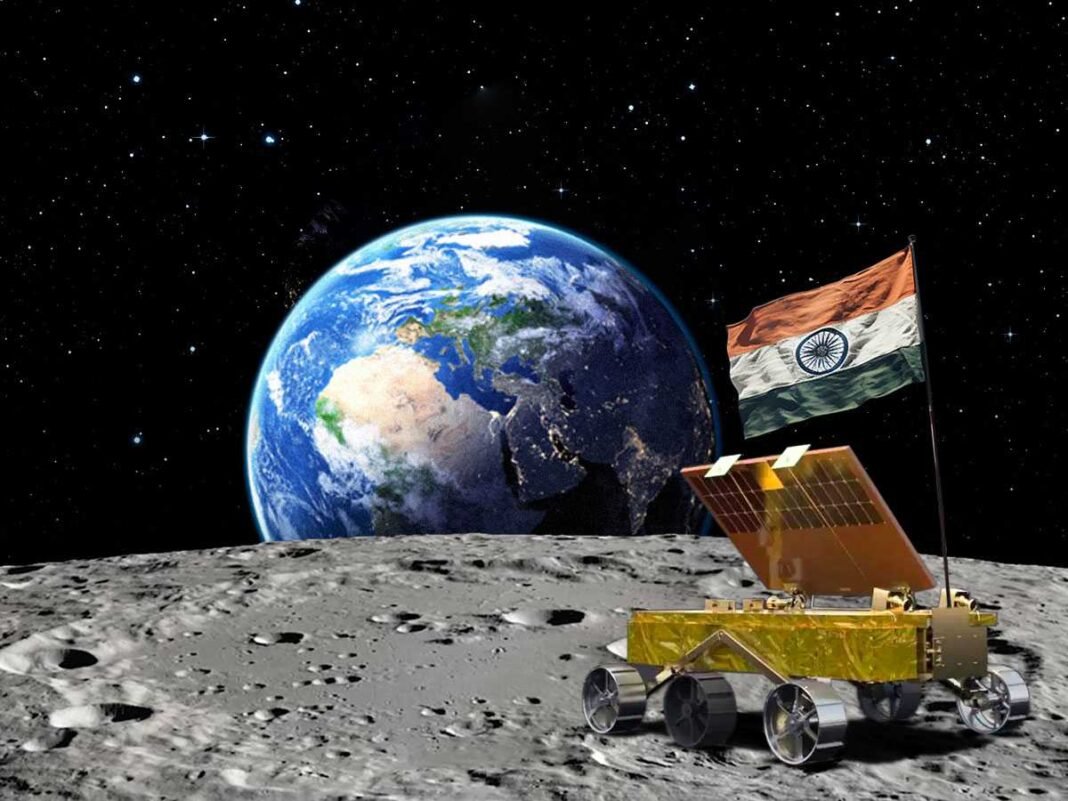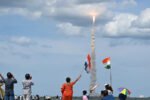By: Dr. Ratan Bhattacharjee
Finally when India is able to reach the South Lunar pole, the question is coming from all corners. “Hi, Sky to whom do you belong?” The question is not made by any poet or a romantic lover. This is the most important question today when the countries are all at a fierce competition for the possession of the Space. We have heard of space wars in the game zone or in the Hollywood industry. But after India too joining the lunar missions and especially after the successful Chandrayaan 3 mission the question of astro-politics is gaining more and more significance, Vikram, vikram , vikram – today the whole universe is probably resonant with the name of India’s Vikram… Let us go back for a while to look into the history of the lunar expeditions conducted by India. On September 7, 2019, the Chandrayaan-2 mission encountered a challenge while attempting to land. The Vikram Lander went off course, leading to a loss of communication with the Lander carrying the Pragyan rover. Despite this unexpected turn of events, the Chandrayaan-2 orbiter still works well when Chandrayaan 3 sends Vikram almost to the South pole of the moon to reach. Luna-25, modern Russia’s first attempt to land a spacecraft on the Moon, has ended in failure with the spacecraft crashing onto the lunar surface, Russian space agency Roscosmos said on Sunday.
The failure once again highlights the risks involved in getting a spacecraft to soft-land on the Moon. The main purpose of Luna-25 was to test technology for landing on the moon, and the loss of the lander during a less risky phase of the mission will add scrutiny to Russia’s space struggles. Luna 25 ends its bid to reach out to the Lunar South pole. This is now being explained as India’s victory over Russia in Astro-Politics. It was Russia which sent its first cosmonaut successfully to the moon. Yuri Gagarin from Russia became the first hman to journey into outer space. Travelling on Vostak I Gagarin completed one orbit of Earth on April 12, 1961 to achieve the first major milestone for the Soviet Union amidst the Space Race which was basically a 20th century competition between two Cold War rivals , the US and the then Soviet Union which were getting ready with the ballistic missile based Nurclear Arms Race. From June 16 to 19, 1963, Valentina Vladimrovna Tereshkova from Russia again became the first woman to fly in space.
Interestingly enough the space race began when the US started its lunar mission. Kathryn Sullivan was the first American woman to walk in space, the first woman to dive to the Challenger Deep in the Mariana Trench (the deepest part of the Earth’s oceans), and is the first and only person to do both. Five national space programs (The Soviet Union, The USA, China, India, Japan and the European Space Agency) have reached the moon with unscrewed missions that achieved varying degrees of success, as well as 2 private/commercial missions from Israel and Japan. All these were basically a part of the Space Race and the efforts of the countries to grab victory in the Astro-Politics which has outdated the Geo-politics. This Space Race is not limited to the geographical invasion. From the New York Times bestselling author of Prisoners of Geography and leading geopolitics expert Tim Marshall comes a must-read book on today’s space including the increasingly tense power struggle between the US, China, and Russia and what it means for all of us here on Earth. In this gripping work, bestselling author Tim Marshall navigates the new geopolitical landscape to show how we got here and where we’re heading. Extensively researched and drawing on the latest information from intelligence, government, and civilian institutions, this book provides a detailed, clear account of the new space race, the power rivalries, and how technology, economics, and war have a ripple effect on everyone across the globe. “Ideals of South-South solidarity continue to motivate space relations between Latin American countries and China,” notes Klinger, not to mention the hope of improving their legislative presence through bilateral and multilateral agreements and/or earning esteem via scientific developments.
Geopolitics is the study of how geography and economics have an influence on politics and on the relations between nations. Geopolitics refers to political factors that are between countries/regions. For example, politics between the US and China or, more recently, Russia and Ukraine. Geopolitical tensions are exactly what they sound like – political issues between or involving two or more countries that cause tension or unrest. The recently published The Future of Geography is an essential read about global power, politics, and the future of humanity. Intergalactic politics echo world politics: the most recognizable space programs and multilateral agreements China’s main interest in space exploration is to deepen asymmetrical power structures. China’s continuation of satellite production in South America, say, is a source of stress for Western security interests. As Global Studies scholar Julie Michelle Klinger says, such an endeavours is seen “as a novelty at best, or with passing alarmism at worst. There are plenty of political and economic interests in outer space cooperation – particularly given their distance from US influence. With India’s programme of lunar exploration India is now becoming a part of this astro-politics. Russian Luna 25 was trying hard to reach the Lunar Soil much before the Indian Chandrayaan-3. But the race in Astro- politics ended in the Tortoise and Hare tale of Aesop. The slow and steady movement of the Chandrayana to the South Pole of the moon finally wins. The success of Chandrayaan 3 is expected to build on the success of its earlier Moon missions. It comes 13 years after the country’s first Moon mission in 2008, which discovered the presence of water molecules on the parched lunar surface and established that the Moon has an atmosphere during daytime; Security is innately connected to the geopolitics of space exploration. India is now being requested by Russia to use Chandrayaan 3 to give them informations on their Luna 25 which stopped sending any signals and probably got inactive on the lunar soil after crash landing. The new strategic partnership between the United States and India is creating opportunities for security cooperation. A key element in this partnership – US-India space cooperation – will most likely become the defining relationship for international space cooperation around which other space-faring nations will posture. The Indian space program is rapidly developing world-class capabilities and presents itself as a worthy partner. The US space program should be able to provide innovative ideas for fruitful collaboration. Despite these propitious circumstances, there are potential obstacles of cost, security, and risk. The opportunity is here, now, for the United States and India each to add an important new jewel to their crown of international space cooperation activities. Most importantly, this new space partnership should enhance the security and prosperity of the United States, India, and the world.
The politics of outer space includes space treaties, law in space, international cooperation and conflict in space exploration, international economics and the hypothetical political impact of any contact with extraterrestrial intelligence. The expansion of resource extraction in outer space will require development of a legal regulatory framework that adequately governs asteroid mining activities. Given the limitation the Moon treaty place on states, it has not been ratified by key players in the space frontier such as The US, China and Russia. Now India may join this group. Furthermore, spaceflight as a whole and space law more particularly has been criticized as a post colonial project by being bull on a colonial legacy and by not facilitating the sharing of access to space and its benefits. Today Russia is going to take help of Chandrayaan 3 for rescuing their lander Luna 25. It is a glorious moment for India and it can now start thinking of using astro-politics for increasing its impact in world geopolitics what China has already started. (The author is in Virginia Commonwealth University now as Affiliate Faculty in English who can be reached at email bhattacharjr@vcu.edu.)







